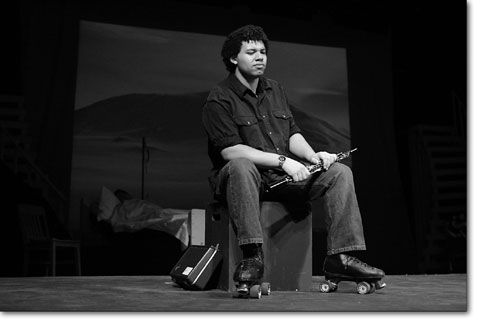|
| ||||
| Hope in a time of trouble SideStory: Coach Carson
by Judith Reynolds "You who live in this sour little age cannot imagine the grandeur,” an aging Russian tells the audience at the beginning of “Angels in America Part II: Perestroika.” In his epic drama, playwright Tony Kushner constantly wrestles with two worlds. He intertwines the mundane and often treacherous with the fantastic and visionary. In the process, this “Gay Fantasia on American Themes” considers disease, love, death, loyalty, and American history through a particular lens. Written at the height of the AIDS crisis in the 1980s, the work is now considered a masterpiece of late 20th-century American drama. Fort Lewis College staged Part I last fall, and next week the Drama Department presents Part II. “This work is so important in so many ways,” Director Theresa Carson said in an interview earlier this week. A visiting professor at the Fort, Carson urges theater lovers to see Part II whether or not they saw Part I. “You’ll very quickly understand the characters and the relationships,” Carson said. “Kushner’s central idea is about compassion and forgiveness – what helps us move forward to overcome intolerance and racism.” At a rehearsal Monday night, Kushner’s brilliant script found its way into an imaginative and truthful production on the college’s Main Stage. A climate of fear (a millennial mood) that pervades Part I also inhabits Part II. The story centers on two men struggling with AIDS. One of the main characters, Prior Walter (played with angry intensity by James Johnson), has been abandoned by his lover and faces disease and a likely death alone. Roy Cohn (portrayed with snarling sarcasm by Geoff Johnson) is based on the real right-wing bully who helped orchestrate Joe McCarthy’s witch hunts in the 1950s and went on to an ignominious death. As the lives of Prior and Cohn intersect, surprising things happen. Fierce, angry and even comic collisions occur. On stage, Cohn lies in his hospital bed throughout the entire play. He taunts his nurse, yells into his phone and talks with the ghost of a woman he sent to the gas chamber: Ethel Rosenberg. Prior is bedeviled by an angel, ignored by his lover and unexpectedly comforted by someone completely outside his sphere. These intersections bring into focus characters who represent strands of American life and religion. That Kushner can find so much humor in an essentially dark play is amazing. Director Carson and her student cast manage to bring out the anger, bewilderment and longing, and the comic undertones throughout. In addition to the two Durango Johnsons (not related), other cast members include: Paonian Julia Schneider, Victoria McKinley (Indiana), Chris Calagias (Mesa Ariz.), Emily Flood (Littleton), Joseph Martinez (Durango), and Stephen Juhl (Aurora).
“Kushner admired Bertolt Brecht,” Carson said, “and I’m using a number of Brechtian techniques to remind the audience we’re in a theater. This isn’t realism. You can see the stage walls and the tape on the floor. Costume elements hang on hooks at the side. Actors play more than one role and move scenery themselves. And I decided to use titles and images on a scrim.” Titles and text introduce sections. Scenic slides set location. The scrim dominates the stage and is flanked by two tall, curving staircases. Cohn’s hospital bed and Walter’s bed are the only realistic elements on stage. Other locations are suggested by lighting and minimal props. Actors sometimes remain on stage to imply their lives have become intertwined with the others, “the idea of interconnectedness,” Carson said about her inventive staging. “We’re in a different time period now,” Carson said, “but the issues are so relevant. This is a bold and intimate play. Socially conscious. Kushner, like Brecht, wanted people to be emotionally moved, think about the issues, and do something about what they had experienced in the theater.” “Angels” is a major American play with plenty of rough language and some sexual exploration – adults-only fare. Even though there are ticket prices for children, don’t even think about it. “Angels” is harsh, provocative, sometimes brutal, and often despairing. But it is also filled with humor and pervaded by an underlying sense of compassion. The old Bolshevik who pits grandeur against “our sour little world” concludes by saying: “And I weep for you.” Kushner’s ultimate message is one of hope, hard-won hope. Carson and company are to be commended for tackling this huge, challenging work. •
|
In this week's issue...
- May 15, 2025
- End of the trail
Despite tariff pause, Colorado bike company can’t hang on through supply chain chaos
- May 8, 2025
- Shared pain
Dismal trend highlights need to cut usage in Upper Basin, too
- April 24, 2025
- A tale of two bills
Nuclear gets all the hype, but optimizing infrastructure will have bigger impact



